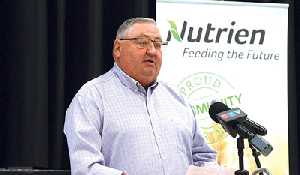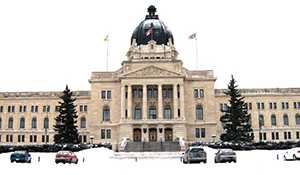Sask Plan replaces federal carbon tax for large industry in Saskatchewan
Saskatchewan's Output-Based Performance Standards Program will replace the federal carbon tax for large industries in Saskatchewan
November 22, 2022, 4:13 pm


On Tuesday, the provincial government received confirmation that a provincial plan has been approved to replace the federally imposed carbon tax on industrial emitters in the province, effective January 1, 2023.
Sectors including oil and gas, mining, manufacturing and processing will all fall under the umbrella of the provincial government’s plan.
This includes utility providers such as SaskEnergy and SaskPower.
However, the federal consumer carbon tax will remain in effect in Saskatchewan.
The Saskatchewan Output-Based Performance Standards (OBPS) Program meets the requirements for the 2023-2030 federal carbon pricing benchmark, including the addition of the electricity generation and natural gas transmission pipeline sectors.
All industrial carbon taxes will now stay in Saskatchewan, saving Saskatchewan industry (and the jobs and families these industries support) an estimated $3.7 billion in federal carbon taxes between now and 2030 compared to federal carbon pricing.
"Now more than ever, the world needs food and energy security – and that means the world needs Saskatchewan and our clean and sustainable, food, fuel and fertilizer," Environment Minister Dana Skoropad said.
"This is not the time for federal climate policies that risk undermining our economic growth and prosperity. Our plan will allow industries to grow and operate sustainably while maintaining our economic competitiveness as a province."
With industrial carbon pricing under provincial control, the number of facilities in Saskatchewan's OBPS Program is expected to double by 2030.
Saskatchewan doesn’t consider its carbon-pricing system a tax because it provides other options to reduce emissions.
That includes paying into a fund to advance green technologies, purchasing offset credits through a cap-and-trade system or meeting performance standards.
Regulated emitters will receive credit for every tonne of carbon emissions under their permitted amount, creating incentives to reduce emissions.
"We're very pleased to hear the announcement from today and appreciate the Saskatchewan Ministry of Environment and Environment and Climate Change Canada for all of the efforts taken to date," Director of Regulatory Affairs and Sustainability for Mosaic Jessica Theriault said. "This decision will not only contribute to ensuring that our Mosaic sites in Saskatchewan remain competitive around the world, but further supports our ESG commitments and continued role in helping to feed the world."
The Saskatchewan OBPS Program will also include credit for carbon capture, utilization and storage (CCUS), which supports Saskatchewan's CCUS strategy. Regulated emitters will have the option to pay into the Saskatchewan Technology Fund, which will create incentives for industry to develop and implement technologies that contribute to meaningful reductions in greenhouse gas emissions intensity.
Please find included below a statement from Prabha Ramaswamy, CEO of the Saskatchewan Chamber of Commerce in relation to the Federal Government's Approval of Saskatchewan's Output-Based Performance Standards Program.
“The Saskatchewan Chamber of Commerce (SCC) is very pleased that a provincial plan has been approved by the Federal Government to replace the federally imposed carbon tax on industrial emitters in the province" said Prabha Ramaswamy, CEO of the Saskatchewan Chamber of Commerce.
"Enabling the expanded use of the Saskatchewan Output-Based Performance Standards (OBPS) Program has been long advocated for by the Saskatchewan Chamber of Commerce. Our province needs made in Saskatchewan solutions to support GHG emission reductions.
"Businesses are facing increased pressures from inflation, supply chain issues, and labour shortages. With this news today, our businesses can remain competitive globally, while taking advantage of incentives to reduce emissions.
"The Saskatchewan Chamber of Commerce appreciates the effort both levels of government put into enabling Saskatchewan’s program. Through smart regulatory efforts like this our business community can continue to strengthen its position as a global leader in supplying food fuel and fertilizer.”



































